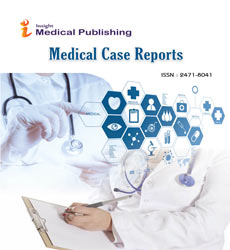Atypical Headache Scenario With A Suspected Case of COVID-19
Mohamed Abdel-Maboud*
Dr. Mohamed Abdel-Maboud*
Faculty of Medicine, Al-Azhar University, Cairo, Egypt
- Corresponding Author:
- Dr. Mohamed Abdel-Maboud
Intern, Al-Azhar University, Cairo, Egypt
Tel: +201273754575
E-mail: MohamedAbdel-Maboud.6.206@azhar.edu.eg
Received date: August 19, 2020; Accepted date: September 15, 2020; Published date: September 22, 2020
Citation: Abdel-Maboud M (2020) Atypical Headache Scenario with a Suspected Case of COVID-19. Med Case Rep Vol.6 No.4:154. DOI: 10.36648/2471-8041.6.2.154.
Abstract
This is an atypical headache scenario in a suspected case of COVID-19. The clinical outcomes, differentials, progression, and reasoning have been discussed and highlighted as possible. Headache is not the focus of published papers about COVID-19 and seems to be underestimated in prevalence and characteristics. The classification of headache based upon position, quality, timing, and associations appears to be insufficient and challenging to clinical application in times of crisis.
Keywords
HR: Heart Rate; RR: Respiratory Rate; BP: Blood Pressure; BPM: Beat/Breath Per Minute
Introduction
To the Editor,
I'm a final year MD candidate in Al-Azhar Medical School, Al- Hussein University Hospital, Cairo, Egypt. Recently, I have been exposed without PPEs to a contact person of two positive COVIDâ?Â19 patients, 2 days later: the contact deteriorated and tested positive. Due to limited resources and highâ?Âflow severe cases, health authorities’ protocol didn't qualify my case for a PCR or a radiological assessment. I self-isolated myself at home and followed up on my signs and symptoms over days. The first day after midnight, I felt dizzy and lightheaded, vital signs were normal and no other symptoms were present. After 6 hours of sleep, I woke up on sever excruciating headache, the temperature reached 38.5°C, but the HR ranged from 70 - 75 bpm, BP was 120/78 mmHg, RR was 10-12 BPM -deep vesicular regular abdominoâ?Âthoracic, no other neurological manifestations, no orbital involvement, no congestion, no rhinorrhea, no cough, no expectoration, no dyspnea, no GIT associations, no urine disturbance, no abnormalities in chest auscultation and percussion. Over the next three days, no more symptoms evolved: the headache didn't regress, didn't respond to 1000 mg acetaminophenâ?Âeven after combined with an NSAID, HR ranged from 80-85 BPM, BP was 110/75 mmHg-but no water-hammer pulse and no systolic nor diastolic murmurs, the temperature reached 39.5 C RR was 10â?Â12 BPM, no other manifestations, and the assessments were repeated at least two times daily.
Blood investigations revealed no abnormalities; no anemia of any kind, no platelet dysfunction, no lymphocytopenia, no leukocytopenia, no thrombocytopenia, and the parameters of CRP, LDH, Dâ?Âdimer, and Ferritin were normal. On palpation and percussion: the liver and the spleen were completely on average, the lung was clear; normal TVF, no crepitations no rhonchi, no rub, no extra resonance nor dullness, and no skin nor mucosal discolorations. This further weakened the hypothesis of COVIDâ?Â19 infection. Still, the headache severity was correlated with the temperature and presented chronologically with the exposure. Meanwhile, I have no personal or family history of any type of migraine and I have not experienced this headache before â?Âeven with the most severe infections that I have been through. I have followed the criteria of the ICHD-III: the closest headache in quality was the type 9.2.2.1 of acute headache attributed to systemic viral infection, I had a diffuse pain, severe in intensity, and related to fever [1].
Still, it was not similar to that of common viruses such as influenza, and it had a bad response to acetaminophen. Tension-type, cluster, trauma, substance, migraine, trigeminal, occipital, and ocular headaches were excluded. There was no unilateral orbital/ supraorbital or temporal pain, no recent psychological distress, no facial pain, no conjunctival injection, no lacrimation, no eyelid edema, no forehead/facial sweating, no ptosis nor miosis, no CO intoxication, no alcohol, no paroxysmal attacks, no sensation of shooting or stabbing or lightning strike, no trauma, no tenderness, no more worsening with day progression, and no association with stress or tension or aggravation by eye movement. Sinusitis, otitis media, acute closed-angle glaucoma, raised intracranial pressure, encephalitis, meningitis, giant cell arteritis, intracranial and subarachnoid hemorrhages were all excluded. There were no mucopurulent nasal discharge, no tenderness over sinuses, no tinnitus, no hearing loss, no prostrating attacks, no painful ear, no vertigo nor nystagmus, no red eyes, no haloes, no corneal clouding, no pupil abnormality, no worsening on waking and no aggravation by cough, sneezing, or bending; no papilloedema, no photophobia, no neck stiffness, no vomiting, no Kernig’s sign, no petechial or purpuric rash, no focal neurological signs, no dysphagia, no speech problem, no amnesia, no scalp tenderness, no jaw claudication, no loss of temporal arterial pulsation, no sudden loss of vision, no dysarthria, no faint, and no variable degree of consciousness.
In fact, I tried playing chess, solving clinical scenarios, and even performing my usual workout -attempting to compare my mental and physical status. The headache responded positively to hand pressure, articulation, distraction -through reading with recitation and metacognition thinking process, but badly to sleeping and rest. I have had incredible challenges every time I want to sleep and even more after waking up, but noticeably no bad or heavy dreams have been experienced. On the fourth and fifth day: the headache still the same, while I was eating my lunch I suddenly felt an episodic burning sensation in my nose. I started feeling like smelling warm dust, no breathing problem no mouth breathing; just the smell with an annoying sensation of close vomiting. An hour later, I could smell nothing; even the strongest smells started to decay. Whenever I tried to smell more the dusty burning sensation aggravated and the headache worsens.
This is an atypical case of headache in susceptible COVID-19 contact. In a recent metaâ?Âanalysis of 40,000 patients: Headache seems to be the 5th most common symptom after fever, cough, fatigue, and dyspnea [2]. Headache is not the focus of published papers about COVIDâ?Â19. Nonetheless, headache seems to be underestimated in prevalence and characteristics; for the majority of the literature concerned with the pulmonary and intensive care features of COVIDâ?Â19, they do not analyse headache -only reporting it in generic descriptions [3]. They didn't specify its attribution whether to tension or infection, cough induced, or hypoxic. Neither did they define at which point the headache developed or whether the patients had a previous history of headaches. Meanwhile, the classification of headache based upon position, quality, timing, and associations appears to be insufficient and challenging to clinical application in times of crisis. Extra parameters such as headache response to pressure, posture, potent analgesics, distraction, and articulation should be eligible for discussion in a future tailored algorithm.
Ethics Approval and Consent to Participate
Not applicable.
Consent for Publication
Authorized.
Availability of Data and Materials
Not applicable.
Competing Interest
The authors declare that they have no competing interests.
Funding
None.
Authors' Contributions
MA observed, interpreted the data, and wrote the final manuscript.
Acknowledgements
Not applicable.
References
- Zhang Y, Kong Q, Chen J, Li L, Wang D, et al. (2016) International Classification of Headache Disorders 3rd edition beta-based field testing of vestibular migraine in China: Demographic, clinical characteristics, audiometric findings and diagnosis statues. Cephalalgia 36: 240-248.
- Borges do Nascimento IJ, Cacic N, Abdulazeem HM, Von Groote TC, Jayarajah U, et al. (2020) Novel coronavirus infection (COVID-19) in humans: A scoping review and meta-analysis. J Clin Med. 9: 941.
- Mao L, Jin H, Wang M, Hu Y, Chen S, et al. (2020) Neurologic manifestations of hospitalized patients with coronavirus disease 2019 in Wuhan, China. JAMA Neurol 77: 683-690.

Open Access Journals
- Aquaculture & Veterinary Science
- Chemistry & Chemical Sciences
- Clinical Sciences
- Engineering
- General Science
- Genetics & Molecular Biology
- Health Care & Nursing
- Immunology & Microbiology
- Materials Science
- Mathematics & Physics
- Medical Sciences
- Neurology & Psychiatry
- Oncology & Cancer Science
- Pharmaceutical Sciences
